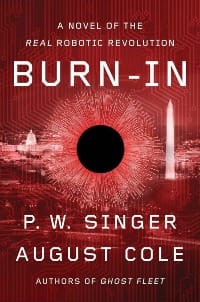New Book Review: "Burn-In"
New book review for Burn-In: A Novel of the Real Robotic Revolution, by P. W. Singer and August Cole, Houghton Mifflin Harcourt, 2020:


Promotional pre-publication advance reading copy provided by Amazon.
The back cover of this novel provides the following synopsis: "America is on the brink of a revolution. AI and robotics have realized science fiction's dreams, but have also taken millions of jobs and made many citizens fear that the future has left them behind. After narrowly averting a bombing at Washington's Union Station, FBI Special Agent Lara Keegan receives a new assignment: to field-test the first police robot. In the wake of a series of shocking catastrophes, the two find themselves investigating a conspiracy whose mastermind is using cutting-edge tech to rip the nation apart. To stop this new breed of terrorist, Keegan's only hope is to forge a new kind of partnership. With every tech, trend, and scene drawn from the real world, 'Burn-In' blends a technothriller's excitement with nonfiction's insight to illuminate the darkest corners of our chilling tomorrow."
It appears, however, that the real robotic revolution is actually boring. While this novel is well-written, it likely won't engage readers unless they are completely unaware of recent advancements in the tech fields it seeks to cover. The idea to marry extensive nonfiction footnotes (about 25 pages in the promotional pre-publication advance reading copy that I was provided) with this fictional text is a good one, but in my opinion the content in most of these footnotes will likely be viewed as fairly commonplace to many. Character development is fairly week, and the politics exhibited by some characters increasingly tends to distract as the storyline progresses. Perhaps the content of this novel is better suited for a major motion picture, as the author tends to overdescribe the simplistic, and underdescribe the complex, and visuals might be the cure for what ails the writing.
All of this said, the masses need more accurate depictions of technology, and this novel is a good attempt at moving in what very well could be the right direction. For example, as the authors mention early in this book while the robot (named "TAMS") is in the process of being introduced, "burn-in is defined as 'the continuous operation of a device, such as a computer, as a test for defects or failure prior to putting it to use'". Quite simply, however, the reason I don't typically review works of fiction is because evaluation can tend to be very subjective. I made an exception in this case because the authors here explicitly sought to blend their storytelling with the real world. At least, the real world from the perspective they aim to tell it, but they at least provide the hopeful statement (regardless of accuracy) that "technology is not destiny: AI's impact on the American worker will be decided not by AI, but by us…by the policies that we vote on and the organizations we choose to build".